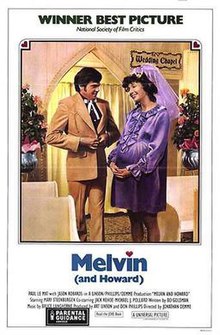
Howard Robard Hughes Jr. was an American aerospace engineer, business magnate, film producer, investor, philanthropist, and pilot. He was best known during his lifetime as one of the richest and most influential people in the world. He first became prominent as a film producer, and then as an important figure in the aviation industry. Later in life, he became known for his eccentric behavior and reclusive lifestyle—oddities that were caused in part by his worsening obsessive-compulsive disorder (OCD), chronic pain from a near-fatal plane crash, and increasing deafness.
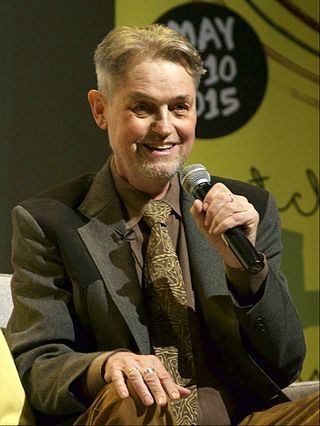
Robert Jonathan Demme was an American filmmaker, whose career directing, producing, and screenwriting spanned more than 30 years and 70 feature films, documentaries, and television productions. He was an Academy Award and a Directors Guild of America Award winner, and received nominations for a BAFTA Award, a Golden Globe Award, and three Independent Spirit Awards.

William Goldman was an American novelist, playwright, and screenwriter. He first came to prominence in the 1950s as a novelist before turning to screenwriting. Among other accolades, Goldman won two Academy Awards in both writing categories—once for Best Original Screenplay for Butch Cassidy and the Sundance Kid (1969) and once for Best Adapted Screenplay for All the President's Men (1976).

Henry Warren Beatty is an American actor and filmmaker. His career has spanned over six decades, and he has received numerous accolades, including an Academy Award and three Golden Globe Awards. He also received the Irving G. Thalberg Award in 1999, the BAFTA Fellowship in 2002, the Kennedy Center Honors in 2004, the Cecil B. DeMille Award in 2007, and the AFI Life Achievement Award in 2008.
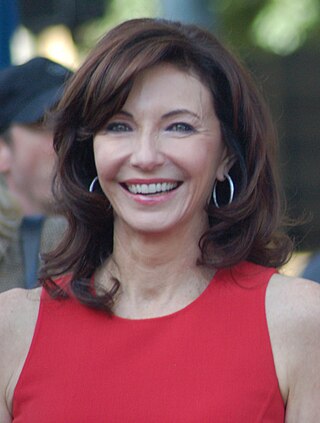
Mary Nell Steenburgen is an American actress, comedian, singer, and songwriter. After studying at New York's Neighborhood Playhouse in the 1970s, she made her professional acting debut in the Western comedy film Goin' South (1978). Steenburgen went on to earn critical acclaim for her role in Time After Time (1979) and Jonathan Demme's comedy-drama film Melvin and Howard (1980), for which she received the Golden Globe Award for Best Supporting Actress – Motion Picture and the Academy Award for Best Supporting Actress.
Paul Le Mat is an American actor. He first came to prominence with his role in American Graffiti (1973); his performance was met with critical acclaim and earned him the Golden Globe Award for New Star of the Year - Actor.
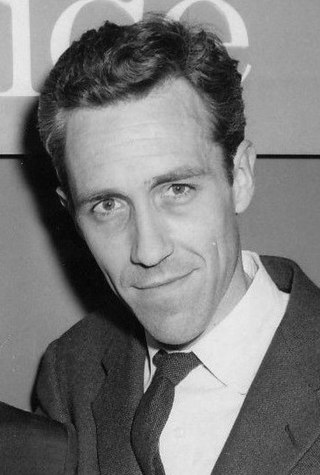
Jason Nelson Robards Jr. was an American actor. Known for his roles on stage and screen, he gained a reputation as an interpreter of the works of playwright Eugene O'Neill. Robards received numerous accolades and is one of 24 performers to have achieved the Triple Crown of Acting having earned competitive wins for two Academy Awards, a Tony Award, and a Emmy Award. He was inducted into the American Theatre Hall of Fame in 1979, and earned the National Medal of Arts in 1997, the Kennedy Center Honors in 1999.

Philadelphia is a 1993 American legal drama film written by Ron Nyswaner, directed by Jonathan Demme and starring Tom Hanks and Denzel Washington. Filmed on location in its namesake city, it tells the story of attorney Andrew Beckett (Hanks) who comes to ask a personal injury attorney, Joe Miller (Washington), to help him sue his former employer, who fired him after discovering he was gay and that he had AIDS.

Something Wild is a 1986 American comedy thriller film directed by Jonathan Demme, written by E. Max Frye, and starring Melanie Griffith, Jeff Daniels and Ray Liotta. It was screened out of competition at the 1987 Cannes Film Festival. The film has some elements of a road movie combined with screwball comedy.
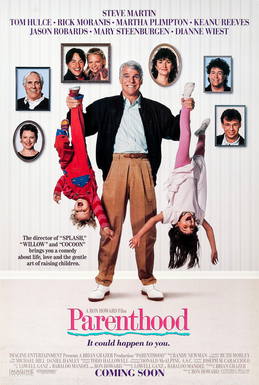
Parenthood is a 1989 American family comedy-drama film with an ensemble cast that includes Steve Martin, Tom Hulce, Rick Moranis, Martha Plimpton, Keanu Reeves, Jason Robards, Mary Steenburgen, and Dianne Wiest.

The Aviator is a 2004 American epic biographical drama film directed by Martin Scorsese and written by John Logan. It stars Leonardo DiCaprio as Howard Hughes, Cate Blanchett as Katharine Hepburn, and Kate Beckinsale as Ava Gardner. The supporting cast features Ian Holm, John C. Reilly, Alec Baldwin, Jude Law, Gwen Stefani, Kelli Garner, Matt Ross, Willem Dafoe, Alan Alda, and Edward Herrmann.
Melvin Earl Dummar was a Utah man who gained attention when he claimed to have saved reclusive business tycoon Howard Hughes in the Nevada desert in 1967, and to have been awarded part of Hughes' vast estate. Dummar's claims resulted in a series of court battles that all ended in rulings against Dummar. A Las Vegas jury determined in 1978 that the will, leaving Dummar $156 million, was a forgery. Dummar's story was later adapted into Jonathan Demme's film Melvin and Howard in 1980, in which he was portrayed by actor Paul Le Mat. A 2005 reinvestigation of the circumstances surrounding the so-called Dummar Will yielded new evidence not previously known, which was argued to bolster Dummar's claims.

Intolerable Cruelty is a 2003 American romantic comedy film directed, co-written and edited by Joel and Ethan Coen, and produced by Brian Grazer and the Coens. The script was written by Robert Ramsey and Matthew Stone and Ethan and Joel Coen, with the latter writing the last draft of the screenplay. The film stars George Clooney, Catherine Zeta-Jones, Geoffrey Rush, Cedric the Entertainer, Edward Herrmann, Paul Adelstein, Richard Jenkins and Billy Bob Thornton. It premiered at the 60th Venice International Film Festival and was released in the United States on October 10, 2003.

Caged Heat, also known as Renegade Girls, is a 1974 women in prison film. It was written and directed by Jonathan Demme for New World Pictures, headed by Roger Corman. The film stars Juanita Brown, Roberta Collins, Erica Gavin, Ella Reid, Rainbeaux Smith, and Barbara Steele.
The 1st Boston Society of Film Critics Awards honored the best filmmaking of 1980. The awards were given on 22 March 1981.
The 46th New York Film Critics Circle Awards honored the best filmmaking of 1980. The winners were announced on 30 December 1980 and the awards were given on 25 January 1981.

Bo Goldman was an American screenwriter and playwright. He received numerous accolades including two Academy Awards, two Golden Globe Awards, two Writers Guild of America Awards as well as the Lifetime Achievement Award in 1998. He also received two BAFTA Award nominations.
The 15th National Society of Film Critics Awards, given on 6 January 1981, honored the best filmmaking of 1980.

The Bonnie Parker Story is a 1958 crime film directed by William Witney. The movie is loosely based on the life of Bonnie Parker, a well-known outlaw of the 1930s. The film stars Dorothy Provine as Parker; Parker's actual historical partner, Clyde Barrow, is renamed Guy Darrow for the film's story, and played by Jack Hogan. The film was released by American International Pictures as a double feature with Machine Gun Kelly starring Charles Bronson in his first leading role.

"Raising Kane" is a 1971 book-length essay by American film critic Pauline Kael, in which she revived controversy over the authorship of the screenplay for the 1941 film Citizen Kane. Kael celebrated screenwriter Herman J. Mankiewicz, first-credited co-author of the screenplay, and questioned the contributions of Orson Welles, who co-wrote, produced and directed the film, and performed the lead role. The 50,000-word essay was written for The Citizen Kane Book (1971), as an extended introduction to the shooting script by Mankiewicz and Welles. It first appeared in February 1971 in two consecutive issues of The New Yorker magazine. In the ensuing controversy, Welles was defended by colleagues, critics, biographers and scholars, but his reputation was damaged by its charges. The essay and Kael's assertions were later questioned after Welles's contributions to the screenplay were documented.
